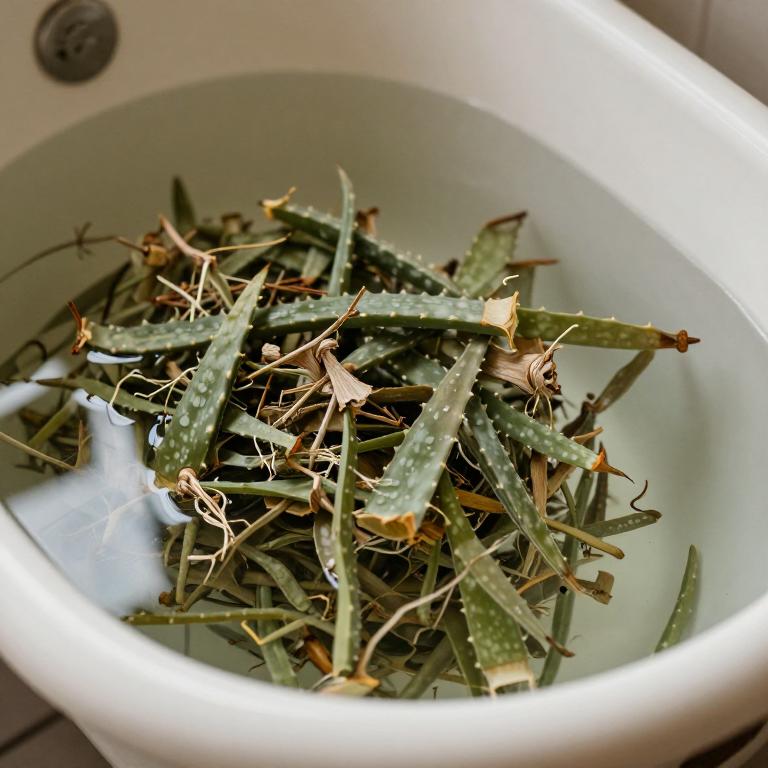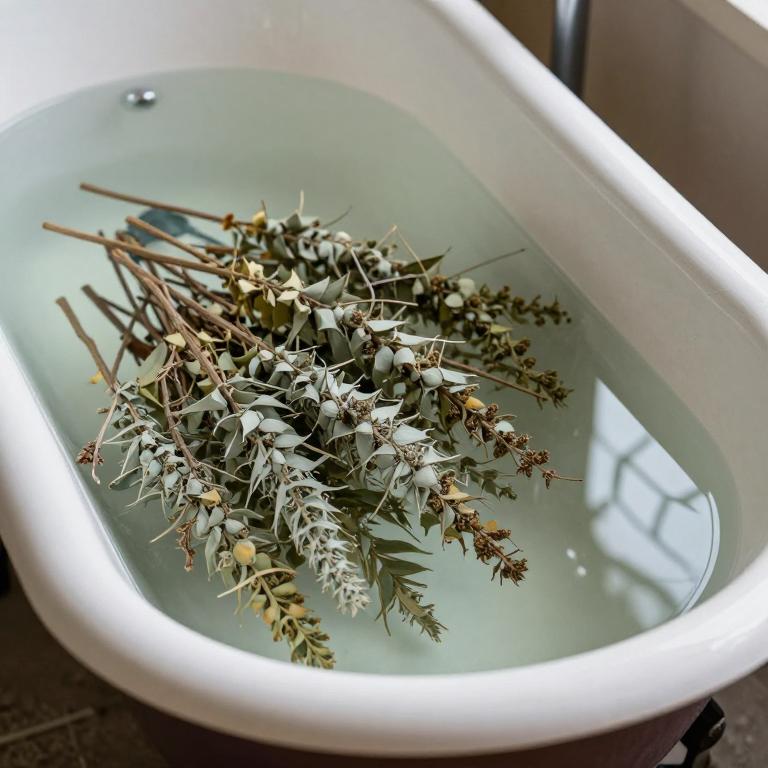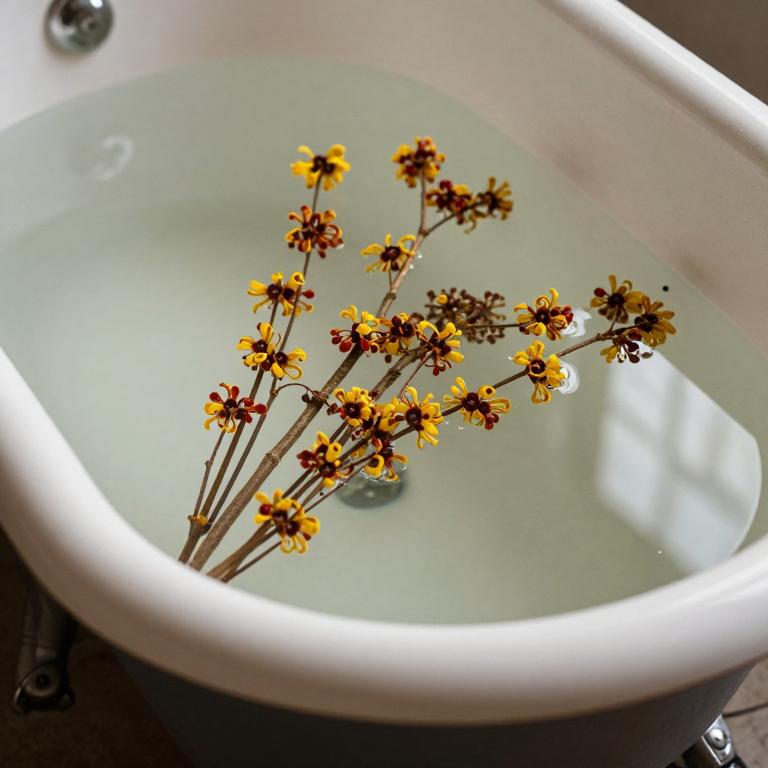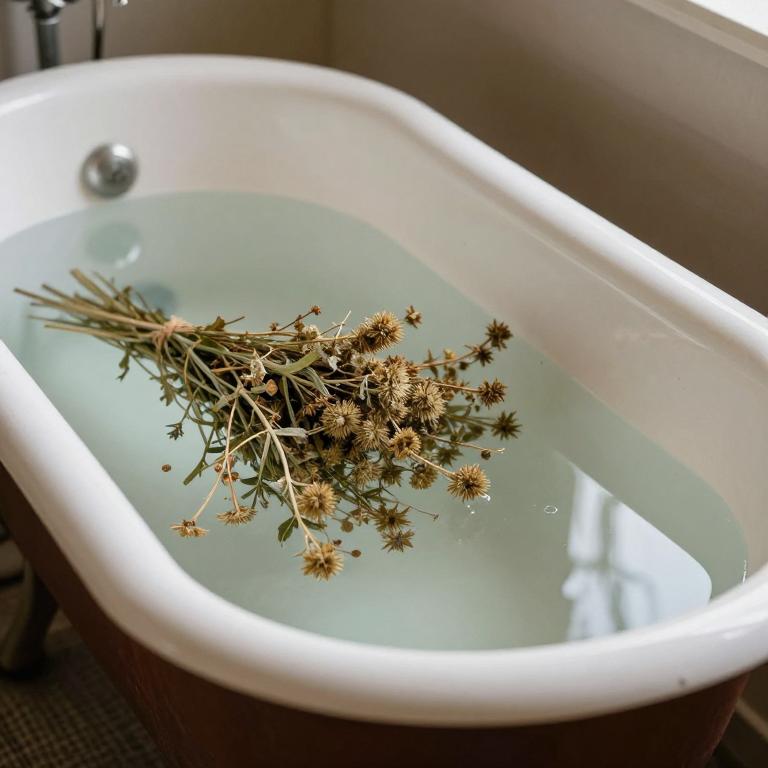10 Best Herbal Baths For Hemorrhoids

Herbal baths can be a soothing and natural remedy for individuals suffering from hemorrhoids, offering relief from discomfort and inflammation.
Certain herbs such as chamomile, calendula, and lavender are known for their anti-inflammatory and soothing properties, making them ideal for use in sitz baths. These herbal infusions can help reduce swelling, ease pain, and promote healing by improving circulation in the affected area. To prepare an herbal bath, steep a handful of dried herbs in hot water and allow the liquid to cool slightly before using it to fill a shallow basin for soaking.
Regular use of herbal baths, combined with good hygiene and dietary adjustments, can significantly improve symptoms and support overall hemorrhoid management.
Table of Contents
- 1. Stinging nettle (Urtica dioica)
- 2. Field horsetail (Equisetum arvense)
- 3. St. john's wort (Hypericum perforatum)
- 4. Aloe vera (Aloe barbadensis)
- 5. German chamomile (Chamomilla recutita)
- 6. English lavender (Lavandula angustifolia)
- 7. Cancer bush (Sutherlandia frutescens)
- 8. Witch hazel (Hamamelis virginiana)
- 9. Dog rose (Rosa canina)
- 10. Blessed thistle (Cnicus benedictus)
1. Stinging nettle (Urtica dioica)

Urtica dioica, commonly known as stinging nettle, has been traditionally used in herbal baths to alleviate symptoms of hemorrhoids due to its anti-inflammatory and astringent properties.
When infused into warm water, the bath can help reduce swelling, soothe irritation, and promote healing of the affected areas. The high concentration of minerals such as potassium and magnesium in stinging nettle may also contribute to improved circulation and reduced discomfort. To prepare the bath, fresh or dried nettle leaves are typically steeped in hot water for several hours before being strained and used as a soaking solution.
While generally considered safe, it is advisable to perform a patch test and consult with a healthcare provider before using nettle baths, especially for those with sensitive skin or existing medical conditions.
2. Field horsetail (Equisetum arvense)

Equisetum arvense, commonly known as field horsetail, has been traditionally used in herbal baths for its astringent and anti-inflammatory properties, which may help alleviate symptoms of hemorrhoids.
The high concentration of silica in horsetail is believed to strengthen blood vessel walls and reduce swelling, making it a popular choice for topical applications. To prepare an herbal bath, horsetail can be steeped in hot water and used to soak the affected area, promoting circulation and soothing irritation. However, it is important to consult a healthcare professional before using horsetail baths, as it may interact with certain medications or cause allergic reactions in some individuals.
While herbal baths may offer some relief, they should be used as a complementary treatment alongside conventional medical care for hemorrhoids.
3. St. john's wort (Hypericum perforatum)

Hypericum perforatum, commonly known as St. John's Wort, has been traditionally used in herbal baths for its anti-inflammatory and soothing properties, which may help alleviate symptoms of hemorrhoids.
When infused into warm water, the active compounds in St. John's Wort, such as hypericin and flavonoids, can reduce swelling and irritation around the affected area. Herbal baths with Hypericum perforatum are often recommended as a gentle, natural remedy to ease discomfort and promote healing without the side effects of pharmaceutical treatments. However, it is important to consult a healthcare provider before using St. John's Wort, as it can interact with certain medications.
Regular use of these baths, combined with proper hygiene and dietary adjustments, may offer significant relief for individuals suffering from hemorrhoids.
4. Aloe vera (Aloe barbadensis)

Aloe barbadensis, commonly known as aloe vera, has been used for centuries for its soothing and healing properties, making it a popular choice for herbal baths aimed at relieving symptoms of hemorrhoids.
When used in a bath, aloe vera can help reduce inflammation, soothe irritation, and promote skin healing around the affected area. The gel extracted from the aloe plant contains anti-inflammatory compounds and antioxidants that may help alleviate discomfort and speed up recovery. To prepare an aloe bath, the gel can be diluted with water and added to warm bath water, allowing the skin to absorb its beneficial properties.
While aloe vera baths can offer relief, they should be used in conjunction with other treatments and under the guidance of a healthcare professional for optimal results.
5. German chamomile (Chamomilla recutita)

Chamomilla recutita, commonly known as German chamomile, has been traditionally used for its soothing and anti-inflammatory properties, making it a popular choice for herbal baths aimed at relieving symptoms of hemorrhoids.
When infused into warm water, chamomile baths can help reduce swelling, irritation, and discomfort associated with hemorrhoids by promoting relaxation of the blood vessels and calming the surrounding tissues. The essential oils in chamomile, such as bisabolol and chamazulene, have demonstrated antimicrobial and analgesic effects, which may further support healing and prevent infection. To prepare a chamomile bath, steep a handful of dried chamomile flowers in hot water for several minutes, then allow the liquid to cool before soaking the affected area.
While herbal baths can provide symptomatic relief, they should be used in conjunction with other recommended treatments and under the guidance of a healthcare professional for optimal results.
6. English lavender (Lavandula angustifolia)

Lavandula angustifolia, commonly known as English lavender, has been traditionally used for its soothing and anti-inflammatory properties, making it a popular choice for herbal baths aimed at alleviating symptoms of hemorrhoids.
When infused into warm water, lavender essential oil or dried lavender flowers can help reduce inflammation, ease discomfort, and promote relaxation of the anal area. The calming aroma of lavender also helps to relieve stress, which is often linked to increased bowel strain and hemorrhoid flare-ups. To prepare a lavender herbal bath, simply add a few drops of lavender essential oil or a handful of dried lavender to a warm bath and soak for 15 to 20 minutes.
While lavender baths can provide symptomatic relief, they should be used in conjunction with other treatments and under the guidance of a healthcare professional for optimal results.
7. Cancer bush (Sutherlandia frutescens)

Sutherlandia frutescens, also known as "cancer bush," is traditionally used in African herbal medicine for its purported healing properties.
While it is not commonly used for hemorrhoids specifically, some practitioners suggest that its anti-inflammatory and astringent properties may offer relief when used in herbal baths. To prepare a bath, the dried herb can be steeped in hot water and then used to soak the affected area, helping to reduce swelling and irritation. However, it is important to consult with a healthcare professional before using Sutherlandia frutescens, as its safety and efficacy for hemorrhoids have not been thoroughly studied in clinical trials.
As with any herbal remedy, individual responses may vary, and it should not replace conventional medical treatments for hemorrhoids.
8. Witch hazel (Hamamelis virginiana)

Hamamelis virginiana, commonly known as witch hazel, is a popular herbal remedy used in baths for the treatment of hemorrhoids due to its astringent and anti-inflammatory properties.
When infused into warm water, witch hazel can help soothe irritated tissues, reduce swelling, and alleviate discomfort associated with hemorrhoids. Herbal baths with witch hazel are often recommended for their gentle yet effective action on the sensitive anal area, making them a natural alternative to over-the-counter treatments. The tannins present in witch hazel help to constrict blood vessels, which can reduce bleeding and promote healing.
Regular use of witch hazel baths may provide relief from symptoms and support overall rectal health.
9. Dog rose (Rosa canina)

Rosa canina, also known as rosehip, is a traditional herbal remedy often used in baths to alleviate symptoms of hemorrhoids.
The anti-inflammatory and soothing properties of rosehip oil help reduce swelling and irritation around the anal area. When used in a warm bath, the oil can improve circulation and promote healing of the affected tissues. It is particularly beneficial for individuals experiencing pain, itching, or inflammation due to hemorrhoids.
Regular use of rosa canina herbal baths may provide natural relief and support overall digestive and anal health.
10. Blessed thistle (Cnicus benedictus)

Cnicus benedictus, also known as St. Benedict's herb, has been traditionally used in herbal baths for the treatment of hemorrhoids due to its anti-inflammatory and astringent properties.
When infused into warm water, the herb helps to soothe irritated rectal tissues and reduce swelling associated with hemorrhoids. The soothing effects of the bath can provide relief from discomfort, itching, and pain, promoting faster healing. Its natural compounds may also help to improve circulation and reduce inflammation in the affected area.
Herbal baths with Cnicus benedictus are often recommended as a complementary therapy to support overall hemorrhoid management.